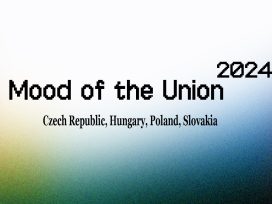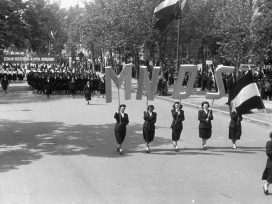The story of the last twenty years, of the period since the “change of regime” introducing a genuinely democratic system of government, is a novel one for Hungary. Yet, it is a very old story. God freed the Israelites from bondage in Egypt in order that they should thenceforth have no other God but Him: they must obey the law, so that they should no longer be enslaved to a despot. There was much rejoicing among the people to begin with. But when things did not go as smoothly as they had imagined, they immediately longed to be back with the fleshpots of Egypt and started worshipping the golden calf. That, in a nutshell, is also what has happened to Hungary over the last twenty years.
Those who have directly known servitude and oppression, and for whom freedom is the greatest value and gift, have not ceased rejoicing to this day. I myself am of that camp. Regime change, as far as I was concerned, was a miracle that one hoped for but did not expect to see, and a miracle it has remained. Whatever has happened since will not alter that. As János Vajda might have written in “Twenty Years On,” his poem of 1876: whatever the woman he apostrophised may have done over the past twenty years, she was still the woman he had given his love to for ever. All I can hope – to stay with János Vajda – is that we too shall be able to produce an equally fine tale under the title of “Thirty Years On”.
That hope is more than an empty longing. A skeleton of democratic institutions has been present virtually from the very start, and these institutions constantly offer themselves for adjustment and correction. Over these twenty years, Hungary has become a member state of the European Union, and in so doing it has almost got others to forget completely (as we ourselves, sad to say, have forgotten) that we fought on the wrong side in both world wars. I might even say that this time, for once, the country has joined the winning side. What is missing is a democratic spirit, a zest for enterprise, bravery and patriotism – scarce commodities. And not among the political classes but among citizens at large, among the elderly as among the young. If I were to start enumerating causes, the list would be endless, especially when I know that others would cite different causes and blame other political figures. It therefore seems more advisable to describe circumstances and details.
Prior to the change of regime, most people in Hungary, if called on to think of a happy country with a democratic political system, would have thought of our happy and prosperous neighbour, Austria. Not primarily as a model of democracy, but as prosperous. If Hungary had managed to break free in 1956, maybe we too might be living in comparable prosperity. But living conditions would have improved even if we had jumped out of the Soviet camp in 1989 on our own, or if the Soviet Union had not imploded. Since that was not how things panned out, no western state has had any political stake in Hungary’s prosperity. The country has stayed relatively poverty-stricken, inheriting the state debts that had been racked up during the last decade or more of the Kádár era; concurrently, the standard of living of a substantial segment of the population sank well below what it had been previously. Hardly surprising, then, that those losing out longed for the fleshpots of Egypt; ominous sign though it was, the socialist victory in the general election of 1994 was understandable. What it also signalled was the weakness of the democratic mentality, a devaluation of freedom. Could that landslide success be put down as a vote for the Hungarian Socialist Party itself, even a vote for the legacy of János Kádár?
The politicians showed that they had no experience in playing democratic politics. They had no chance or time to learn either, and hence they carried on doing what they knew already, or had learned. When in opposition (all due respect to the exceptions) they do not comport themselves as the opposition to a democratically elected government but as the opposition to a party dictatorship. As if they alone were carrying the flag of honesty against the dishonest. When, on the other hand, they become the governing party (and here it is hard to think of a significant exception) regardless of age they pursue the same paternalistic, populist political game.
A democratic politician needs certain diplomatic skills. He needs flexible contacts with all the players who stand for democratic consensus. Very few politicians in Eastern Europe, it seems, have acquired that ability. Furthermore it is expected of a population schooled in democracy that it shall show respect for those in high office, whoever may occupy these posts. That capacity – indeed, the disposition – is not developing but, over the last fifteen years, it has been deteriorating.
Extremist antidemocratic and racist forces and political bodies are on the rise. The right wing often accepts their support, and even more often exploits the disregard for democratic norms for its own ends. The left wing often feels more secure, protected by legalistic formalities, than by mobilising public opinion. Party-political point-scoring in parliament (which is decisive, of course) is rigidly contrasted with political point-scoring in the streets.
It is a widely repeated quip that success in politics depends on communication. The media shape public opinion by taking slogans from the vocabulary of mass democracies and parrot them, thinking that this makes democrats too. A democratic mentality, however, only arises in democratic actions, while the success of the communication process depends of the receptiveness of those at the receiving end.
Ideals are also in doubt. The left wing operates with its traditional bric-à-brac. Under other conditions, some of these ideals might even be productive. One such, for instance, is the social democratic idea of the welfare state; alas, a precondition for a functioning welfare state policy is a pre-existing degree of prosperity. For Hungary right now that can only be a dream. The right also enlists old ideologies without giving them new meaning. The worst of these is, perhaps, the idea of patriotism, even though symbolic politicising plays only a very small role here. Being a good citizen makes a person a good patriot. But the biggest problem of all is that neither the older nor the younger generation places much value on personal freedom.
There are serious problems with the younger generation not just in Hungary but in almost all the EU member states. It seems almost as if the modern democracies of Europe – unlike the USA – have been unable to bring their young people up to value freedom or to practise democracy. In Hungary, to compound the problem, the older generation has a short memory. They seem to have forgotten the security police, the informers, the almost routine resort to hypocrisy, sneakiness and outright lies. Instead, nostalgia grows merely for that household plot that supplemented collective farm wages and for the days of full employment. Some draw sustenance from the ideology of the pre-war Horthy times, a period few have personally experienced, and are happy to feed this to others, unrolling a map of Greater Hungary and cursing all of Hungary’s neighbours. There are now young people who never lived under any other political system than the present one; no wonder they can only see the darker sides of capitalism and the liberties it entails. The movements and parties that carried out the change of regime are also partly to blame for this. Freedom – the right to personal freedom, freedom of assembly, freedom of religion and freedom of speech – was taken so much for granted as an indisputable value that nobody noticed that not everyone necessarily agreed. We of the democratic Hungarian intelligentsia have to admit that we, too, were partly responsible for everything that happened in the heady changeover years, and what is happening now.
We have been unable to communicate our image and knowledge of the new world that we had entered. Maybe we have been so preoccupied with the political agenda of the day that we failed to consider the broader aspects and interconnections of our new world. Do people really understand, if only a minority, the rules and opportunities of the world in which we now live? If we say capitalism, they understand: privatisation, loss of jobs, and foreign capital. What do people know about the market? Do they know, for instance, what is really meant by a self-regulating market, state regulation and state intervention? What do they know about democracy? In most cases it amounts to thinking there is an unnecessary parliament, bickering parties, corrupt politicians, lying, power-mad, extremely well-paid idlers, or worse. That is an unfair characterization even of the current Hungarian parties and politicians and their, sadly, all too weak performance. And when asked what can be done about the situation, the answer usually given is: nothing. Only bluster, whinge and blaming others.
Hungary’s populace is less ready to utilise the opportunities that it has. Neither those that came with the change of regime, nor those that resulted from accession to the European Union. Proportionately many fewer young Hungarians than the young of other Eastern European countries are willing to take on the challenge of working abroad; those who do tend to be those with higher qualifications, precisely those who are most needed in Hungary. Many are disinclined to move any distance to try their luck somewhere else, even within Hungary itself, preferring to scrape by on unemployment benefits.
Mobility exists where there was no socialist paternalism. It is time we woke up to the fact that the final years of the Kádár era left their mark on the Hungarian character. Has the “best barracks” in the socialist camp proved to be the “worst barracks” following 1989? How are we going to finally free ourselves of the legacy of the Kádár years?
Only if we manage to throw off that burden shall we be able to write a more cheerful “thirty years on” report. The politicians do not have the luxury of electing another people for themselves, but does the Hungarian people elect those who are best for themselves? It is not a question of who started this or that: we should not be so childish as to carry on such quarrelling till we drop from old age. It will only be through the efforts of all those who play a part in politics, electors and elected alike, that Hungary will be freed from this burden. A fresh page needs to be turned – for everyone, all at once.







